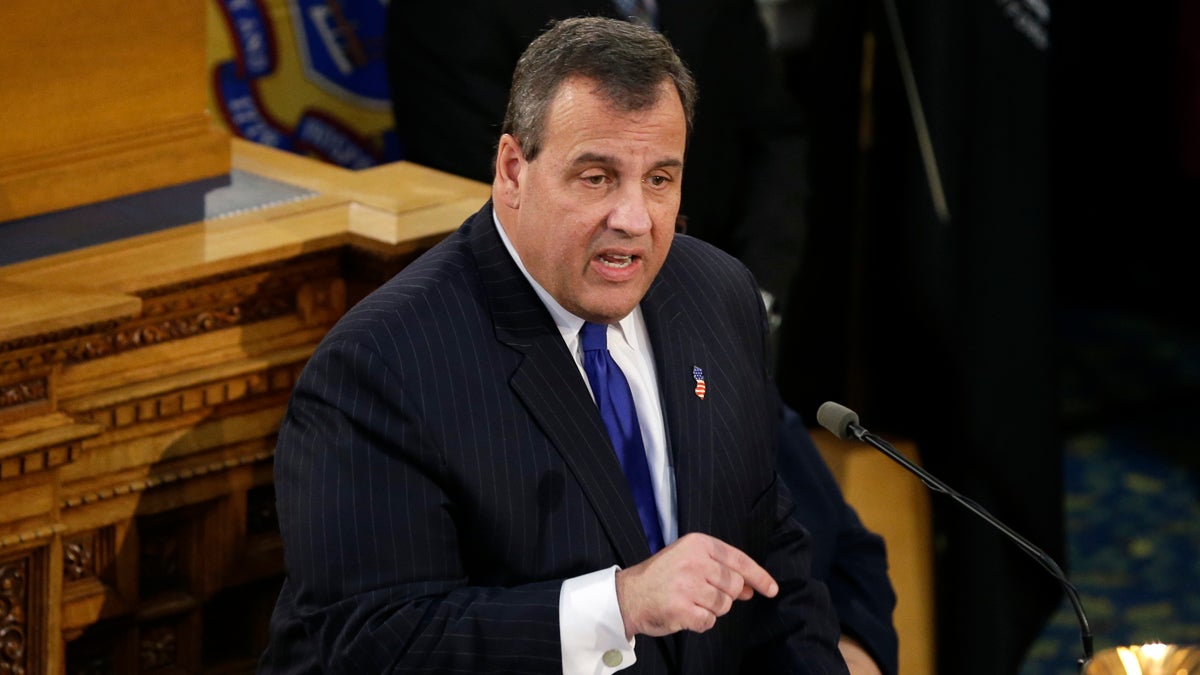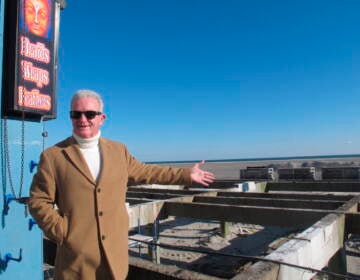Commentary: How Christie’s presidential campaign might influence next year’s budget plan

New Jersey Gov. Chris Christie delivers his budget address, Tuesday, Feb. 24, 2015. (AP Photo/Mel Evans)
Approximately three months from now, Gov. Chris Christie will submit his administration’s fiscal year 2017 budget to the Legislature. Whether he will deliver it as governor, as a candidate for the Republican presidential nomination, or as a bit of both is unclear.
What is clear, though, is that it will be a spending plan that will, in all probability, make a great many people unhappy.
The State of the State address — delivered when the new Legislature convenes in January — is more of a ceremonial occasion. It is usually a broadly themed speech short on specifics, while recounting past accomplishments, delineating challenges, and offering clues to the Administration’s legislative agenda.
The budget is the more revealing document, projecting the administration’s rate of economic growth and revenue assumptions, identifying priorities and allocating the money to achieve them.
At this point in the budget-drafting process, the broad outlines are already in place. Cabinet officers have submitted their requests to the Treasury Department, where the army of number crunchers and bean counters will go about their daily toil of crunching and counting.
Once the constitutionally and statutorily mandated expenses are accounted for, the remaining parts of the budget will be molded by political pressures and considerations.
Hence, the unhappiness.
While Christie may use his January speech to reference the future of the soon to be bankrupt Transportation Trust Fund and once again call for major changes in the seriously underfunded public-pension system, a detailed official administration position on both these issues will await the budget submission.
Renewal of the trust fund and the potential gasoline-tax implications it presents and the fierce political confrontation over the level of the state’s contribution to the pension fund have dominated the debate for months and it seems unlikely that either will be settled to everyone’s satisfaction in the budget.
A third issue with equally controversial potential arose recently when Education Commissioner David Hespe suggested that there would be no appreciable increase in state aid to local school districts in the coming fiscal year, not, he indicated, because of a stinginess on the part of the administration but because it was unaffordable.
Holding aid funding to existing levels will place further strain on school-district budgets along with greater pressures on local property taxes. Many districts face a struggle with holding spending increases below the state-mandated two percent cap while meeting their steadily increasing operational costs.
Property taxes have already reached and, in many instances, surpassed a breaking point for many homeowners. Relief has been minimal and, even though the rate of growth has been slowed, the average property tax is slightly below $8,200 a year — far and away the highest in the nation. Moreover, the number of municipalities in which the average tax liability exceeds five figures is growing as well.
When Christie — budget in hand — stands before the joint legislative session, the issue of taxes will cast a long shadow, whether it involves a gas tax, property taxes, or some other proposed levy to boost the contribution to the pension fund.
His six-year history has been as a ferocious anti-tax governor who has vetoed numerous increases enacted by the Democratically controlled Legislature and who has incorporated his actions into a major theme in his quest for the Republican presidential nomination.
Should his candidacy still be viable by the time he submits his budget, there will be no question about a shift in his position. His history and his national ambitions demand he continue to be hard-line anti-tax and, with Democrats lacking sufficient votes to override the inevitable gubernatorial vetoes of revenue-raising proposals, there appears to be precious little common ground available.
Despite warnings from business leaders and interest groups that the state’s transportation infrastructure has deteriorated to the point of crisis, Christie has remained adamant in opposition to raising the gas tax to replenish the trust fund while Republicans in the Legislature have insisted that any such increase be accompanied by reduction or elimination of the inheritance or estate tax. For Democrats, such a deal is a nonstarter.
Even further out of the question is a tax increase to boost the state’s contribution to the pension system, particularly since Christie is armed with a Supreme Court ruling that freed him from the 2011 mandate to appropriate a set amount each year and essentially gave him a free hand to determine the annual level of support.
Flat funding of state aid to school districts will produce the usual cries of outrage over adding an additional burden on already strapped local taxpayers, but if decades of history are any indication, there will be little of substance offered for relief.
There is no doubt that Christie’s status as a national candidate and his campaign strategy built around fiscal conservatism will have an enormous impact on his budget proposal. He will use it to demonstrate his commitment to leaner, less-costly government, while portraying himself as fighting the forces of free-spending, tax-raising Democrats.
At the same time, Democrats with sights set on the 2017 gubernatorial election will accuse Christie of crushing the middle class, turning his back on low-income individuals and families, allowing the state’s transportation network to crumble, and exacerbating a property-tax burden that drives people out of state.
State budgets have always been seen through a politics-driven prism, leading to a belief that it is ninety percent a political document and 10 percent a fiscal document. Next year, that may change. It could become a 100 per cent political document.
___________________________________________________________
NJ Spotlight, an independent online news service on issues critical to New Jersey, makes its in-depth reporting available to NewsWorks.
WHYY is your source for fact-based, in-depth journalism and information. As a nonprofit organization, we rely on financial support from readers like you. Please give today.




